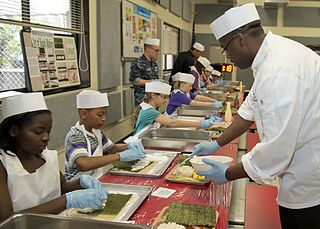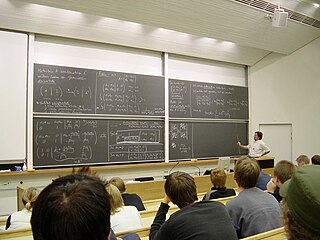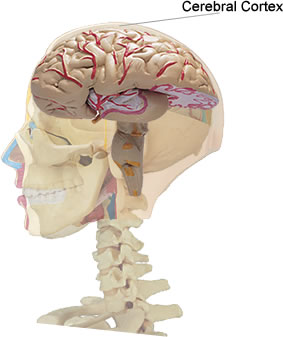Related Research Articles

In their most common sense, the terms thought and thinking refer to conscious cognitive processes that can happen independently of sensory stimulation. Their most paradigmatic forms are judging, reasoning, concept formation, problem solving, and deliberation. But other mental processes, like considering an idea, memory, or imagination, are also often included. These processes can happen internally independent of the sensory organs, unlike perception. But when understood in the widest sense, any mental event may be understood as a form of thinking, including perception and unconscious mental processes. In a slightly different sense, the term thought refers not to the mental processes themselves but to mental states or systems of ideas brought about by these processes.
Heuristic, or heuristic technique, is any approach to problem solving or self-discovery that employs a practical method that is not guaranteed to be optimal, perfect, or rational, but is nevertheless sufficient for reaching an immediate, short-term goal or approximation. Where finding an optimal solution is impossible or impractical, heuristic methods can be used to speed up the process of finding a satisfactory solution. Heuristics can be mental shortcuts that ease the cognitive load of making a decision.

Learning is the process of acquiring new understanding, knowledge, behaviors, skills, values, attitudes, and preferences. The ability to learn is possessed by humans, animals, and some machines; there is also evidence for some kind of learning in certain plants. Some learning is immediate, induced by a single event, but much skill and knowledge accumulate from repeated experiences. The changes induced by learning often last a lifetime, and it is hard to distinguish learned material that seems to be "lost" from that which cannot be retrieved.
Critical thinking is the analysis of available facts, evidence, observations, and arguments to form a judgment. The subject is complex; several different definitions exist, which generally include the rational, skeptical, and unbiased analysis or evaluation of factual evidence. Critical thinking is self-directed, self-disciplined, self-monitored, and self-corrective thinking and accordingly, a critical thinker is one who practices the skills of critical thinking or has been schooled in its disciplines. Richard W. Paul has suggested that the mind of a critical thinker engages both the intellectual abilities and personal traits necessary for critical thinking. Critical thinking presupposes assent to rigorous standards of excellence and mindful command of their use. It entails effective communication and problem-solving abilities as well as a commitment to overcome native egocentrism and sociocentrism.

Lateral thinking is a manner of solving problems using an indirect and creative approach via reasoning that is not immediately obvious. It involves ideas that may not be obtainable using only traditional step-by-step logic. The term was first used in 1967 by Maltese psychologist Edward de Bono in his book The Use of Lateral Thinking. De Bono cites the Judgment of Solomon as an example of lateral thinking, where King Solomon resolves a dispute over the parentage of a child by calling for the child to be cut in half, and making his judgment according to the reactions that this order receives. Edward de Bono also links lateral thinking with humour, arguing it entails a switch-over from a familiar pattern to a new, unexpected one. It is this moment of surprise, generating laughter and new insight, which facilitates the ability to see a different thought pattern which initially was not obvious. According to de Bono, lateral thinking deliberately distances itself from the standard perception of creativity as "vertical" logic, the classic method for problem solving.

In psychology, cognitivism is a theoretical framework for understanding the mind that gained credence in the 1950s. The movement was a response to behaviorism, which cognitivists said neglected to explain cognition. Cognitive psychology derived its name from the Latin cognoscere, referring to knowing and information, thus cognitive psychology is an information-processing psychology derived in part from earlier traditions of the investigation of thought and problem solving.

In contemporary education, mathematics education—known in Europe as the didactics or pedagogy of mathematics—is the practice of teaching, learning, and carrying out scholarly research into the transfer of mathematical knowledge.
The concepts of fluid intelligence (gf) and crystallized intelligence (gc) were introduced in 1963 by the psychologist Raymond Cattell. According to Cattell's psychometrically-based theory, general intelligence (g) is subdivided into gf and gc. Fluid intelligence is the ability to solve novel reasoning problems and is correlated with a number of important skills such as comprehension, problem-solving, and learning. Crystallized intelligence, on the other hand, involves the ability to deduce secondary relational abstractions by applying previously learned primary relational abstractions.

Constructivism is a theory in education which posits that individuals or learners do not acquire knowledge and understanding by passively perceiving it within a direct process of knowledge transmission, rather they construct new understandings and knowledge through experience and social discourse, integrating new information with what they already know. For children, this includes knowledge gained prior to entering school. It is associated with various philosophical positions, particularly in epistemology as well as ontology, politics, and ethics. The origin of the theory is also linked to Swiss developmental psychologist Jean Piaget's theory of cognitive development.
Coping refers to conscious strategies used to reduce unpleasant emotions. Coping strategies can be cognitions or behaviours and can be individual or social.

Problem solving is the process of achieving a goal by overcoming obstacles, a frequent part of most activities. Problems in need of solutions range from simple personal tasks to complex issues in business and technical fields. The former is an example of simple problem solving (SPS) addressing one issue, whereas the latter is complex problem solving (CPS) with multiple interrelated obstacles. Another classification is into well-defined problems with specific obstacles and goals, and ill-defined problems in which the current situation is troublesome but it is not clear what kind of resolution to aim for. Similarly, one may distinguish formal or fact-based problems requiring psychometric intelligence, versus socio-emotional problems which depend on the changeable emotions of individuals or groups, such as tactful behavior, fashion, or gift choices.
Metacognition is an awareness of one's thought processes and an understanding of the patterns behind them. The term comes from the root word meta, meaning "beyond", or "on top of". Metacognition can take many forms, such as reflecting on one's ways of thinking and knowing when and how to use particular strategies for problem-solving. There are generally two components of metacognition: (1) knowledge about cognition and (2) regulation of cognition.
John Robert Anderson is a Canadian-born American psychologist. He is currently professor of Psychology and Computer Science at Carnegie Mellon University.
Reasoning based on relations of proportionality is one form of what in Piaget's theory of cognitive development is called "formal operational reasoning", which is acquired in the later stages of intellectual development. There are methods by which teachers can guide students in the correct application of proportional reasoning.

The following outline is provided as an overview of and topical guide to thought (thinking):
Adaptive expertise is a broad construct that encompasses a range of cognitive, motivational, and personality-related components, as well as habits of mind and dispositions. Generally, problem-solvers demonstrate adaptive expertise when they are able to efficiently solve previously encountered tasks and generate new procedures for new tasks. This definition can be contrasted with more traditional ideas of expertise popularized by Chi and others, which do not typically consider adaptation to completely novel situations. Its empirical validity has been examined in a number of training and learning contexts. The term was first coined by Giyoo Hatano and Kayoko Inagaki, to tease out the variability within groups of experts. Hatano and Inagaki, described two types of expertise: routine expertise, or classic expertise, and adaptive expertise. They defined routine expertise as involving mastering procedures in such a way as to become highly efficient and accurate, whereas developing adaptive expertise requires an individual to develop conceptual understanding that allows the "expert" to invent new solutions to problems and even new procedures for solving problems. To illustrate, imagine two sushi chefs: one who makes every piece perfectly but routinely makes the same few types over and over, and one produces new menus frequently. To some, this is an unfair comparison, as ones' environment supports behavior. For example, the routine of the classic expert sushi chef may be tied to his restaurant environment, and this chef may be able to break out of the routines easily given a different situation. However, the adaptive expert chef clearly demonstrates flexible knowledge and performance of sushi-making. Learning Scientists are interested in adaptive expertise, in part because they would like to understand the types of learning trajectories that may allow practitioners break free from routines when necessary.

Analytical skill is the ability to deconstruct information into smaller categories in order to draw conclusions. Analytical skill consists of categories that include logical reasoning, critical thinking, communication, research, data analysis and creativity. Analytical skill is taught in contemporary education with the intention of fostering the appropriate practises for future professions. The professions that adopt analytical skill include educational institutions, public institutions, community organisations and industry.
Polytely comprises complex problem-solving situations characterized by the presence of multiple simultaneous goals. These goals may be contradictory or otherwise conflict with one another, requiring prioritisation of desired outcomes.
Cognitive skills, also called cognitive functions, cognitive abilities or cognitive capacities, are brain-based skills which are needed in acquisition of knowledge, manipulation of information and reasoning. They have more to do with the mechanisms of how people learn, remember, solve problems and pay attention, rather than with actual knowledge. Cognitive skills or functions encompass the domains of perception, attention, memory, learning, decision making, and language abilities.

Neo-Piagetian theories of cognitive development criticize and build upon Jean Piaget's theory of cognitive development.
References
- ↑ Adding it Up: Helping Children Learn Mathematics By Jeremy Kilpatrick, Jane Swafford, Bradford Findell, National Research Council (U.S.). Mathematics Learning Study Committee Edition: illustrated Published by National Academies Press, 2001 ISBN 0-309-06995-5, 978-0-309-06995-3. Page 170
- ↑ How Students Learn: History, Mathematics, and Science in the Classroom By National Research Council (U.S.). Committee on How People Learn, A Targeted Report for Teachers, Suzanne Donovan, John Bransford Edition: illustrated Published by National Academies Press, 2005 ISBN 0-309-08949-2, 978-0-309-08949-4. Page 218
- ↑ Adaptive Reasoning for Real-world Problems: A Schema-based Approach By Roy M. Turner Edition: illustrated Published by Lawrence Erlbaum Associates, 1994 ISBN 0-8058-1298-9, 978-0-8058-1298-5. Page 4